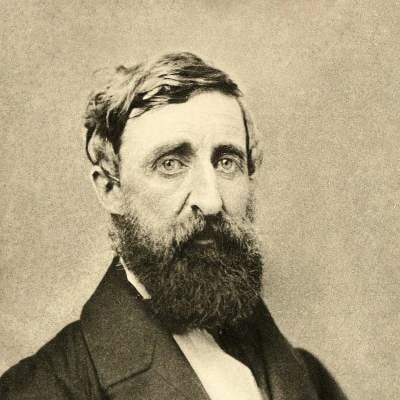
Birthdate: 12th July 1817
Nationality: American
Bio:
Henry David Thoreau was an American author, poet, philosopher, abolitionist, naturalist, tax resister, development critic, surveyor, historian, and leading transcendentalist. He is best known for his book Walden, a reflection upon simple living in natural surroundings, and his essay “Civil Disobedience”, an argument for individual resistance to civil government in moral opposition to an unjust state. Thoreau’s books, articles, essays, journals, and poetry amount to more than 20 volumes.
Thoreau was born in 1817 in Concord, Massachusetts. He was descended from a French ancestor who immigrated to the New World in the 17th century. Thoreau’s mother, Cynthia Dunbar, died of tuberculosis when he was young. Thoreau’s father encouraged him to join the family pencil-making business, but he instead followed his own pursuits. Thoreau attended Harvard University, graduating in 1837. After graduating, he taught school in Concord for a few years. Around 1839, he started lecturing on the American West, and in 1844 he published A Week on the Concord and Merrimack Rivers, his first published work, about his 1861 exploration of rivers with his brother, John.
Thoreau is best known for Walden, a reflection upon simple living in natural surroundings, and his experiment living in a small cabin alone for two years and two months in a wooded area owned by his friend and mentor Ralph Waldo Emerson in what is now Concord, Massachusetts. During that time, he wrote his most famous work Walden, regarding simple living in natural surroundings, where he advocated simplifying one’s lifestyle and avoiding materialism. To quote Thoreau himself, “I went to the woods because I wished to live deliberately, to front only the essential facts of life, and see if I could not learn what it had to teach, and not, when I came to die, discover that I had not lived.”
Towards the end of the 1840s, Thoreau became convinced that individuals had a duty to refuse to cooperate with an unjust government. In July 1846, after returning from a trip to Maine where he had spent time at Walden Pond, Thoreau refused to pay his Massachusetts poll tax, as a protest against the Mexican-American War and slavery. For his refusal, he was imprisoned for one night at Concord Jail. His refusal to pay taxes was a metaphor for his growing disillusionment with established religion and politics. To quote Thoreau himself: “Under a government which imprisons any unjustly, the true place for a just man is also a prison.” His experience in prison was the inspiration for his 1848 essay “Resistance to Civil Government”, also known as “Civil Disobedience.”
In his later years, Thoreau took several extended tours of Maine woods, as recounted in his book The Maine Woods. He also continued his naturalist observations and studies of plant and animal life, publishing his findings in field guides and natural history essays. He died in 1862 of tuberculosis in Concord at age 44. After his death, his friend and mentor, Ralph Waldo Emerson, described Thoreau as “the most original American genius yet to appear on the planet.” Henry David Thoreau remains a seminal figure in American environmentalism and anti-war politics. His ideas and ideals continue to provide intellectual groundwork for the environmental movement, the anti-globalization movement, and other progressive causes.

